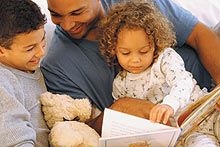 By Richard Saunders
By Richard Saunders
Member, Children’s Rights Council of Illinois
I was recalling a conversation I had with my divorce lawyer while in the midst of my own child custody quarrel, about the typical activities I engaged in with my children.
My lawyer’s response was that my activities would demonstrate to the court that if the kids resided with me, the kids would be getting “both a mother and a father.”
I replied that I am not trying to be their mother; I like to think of myself as an omni-parent.
I thought to myself, “Do I really want to go to court and look as if I can assume, or worse, usurp the role of the other parent? Somehow that’s supposed to make me look like a better parent? How is that fostering a caring and loving relationship between the children and both parents?”
In hindsight, my lawyer’s advice ironically may have had some merit, given the convoluted logic and misperceptions of many family law courts.
Whatever emotional, physical or financial needs my children require, I attend to them. It’s that simple. Men have been stitching up each other on the battlefield for millennia.
Yet if their child falls and skins their knee or makes poopie in the pants, men are conditioned to react like Edith Bunker in a distressed command module.
If you are a single parent, you frequently have to immediately step into what are perceived as non-traditional roles (e.g., changing soiled clothing, addressing a physical or emotional upset, kissing a boo-boo, fixing a broken toy, styling hair, tying a pretty bow and selecting appropriate clothes). Other roles can wait for and may be best done by the other parent (e.g., fingernail painting, makeup, shaving, etc.).
Furthermore, it’s nice if these roles are respected. Although shaving is a good example of an awkward mom-son interaction, so is feminine hygiene an example of an awkward dad-daughter interaction.
On the other hand, if out of necessity, practicality, or your child’s own wishes that one parent assist them in these activities, it does not follow that the children will grow up maladjusted, confused or gender-bent. Rather, it’s about being there for them.
But other than these few examples of activities best left to the other parent, I strain to think of any others. Most traditional roles of mothers and fathers are really up for grabs now, such as the traditional father roles of playing catch, learning to ride a bike, baiting a hook, working with tools and shooting a BB gun.
Consequently, while on an Internet dating site I was intrigued when I saw a single mom’s profile touting her abilities at these same activities and more with her teenage son.
Likewise, the traditional mother roles of shopping, cooking, cleaning, dancing and crafting are evaporating. I think it underscores why the quantity of parenting time you are “awarded” with your children is just as important as the quality of time you spend with them. How is a child going to learn sports or sewing from their parent only on alternate weekends?
Read Related Article:
We as a society are delegating virtually all of our traditional parenting roles to non-parents anyway: education, religious lessons, swimming lessons, dancing lessons, computer training, craft making, even lawn care and house cleaning are often outsourced.
With increasing frequency both parents’ parenting role consists merely of sequentially driving our children to non-parents for parenting (teachers, coaches, instructors, etc.). Like their parents, even our children’s traditional roles are being blurred into oblivion. Does any kid still have a paper route after school anymore? And let’s face it, it has been at least two generations since kids milked a cow, collected eggs, or gathered coal before going to school.
I think the single most important thing either parent can do is simply talk to their kids and then listen. This is the most basic and gender-neutral activity a parent and child can engage in.
Talking and listening to your kids is virtually always mentioned in parenting articles that are directed at traditional families. Yet, when the subject of parenting in split households comes up it’s virtually never mentioned. Instead the focus seems to be over where the scrimmage line is over parenting roles.
My kids are not quite four years old. A couple of times a week when things are quiet, I ask them if they want to talk. It’s amazing what they say. Sometimes it’s princesses and cars, sometimes it’s about their other home, sometimes it about their sibling, sometimes it’s about a fear, curiosity or interest of theirs. Sometimes they will just come up to me and say, “Dad, can we talk?” Very fulfilling. It’s more gratifying than reading to them.
Hopefully, this is just the beginning of lifelong lines of communication.
Children’s Rights Council of Illinois is dedicated to collaborating with others to advance shared parenting solutions for children and the adoption of best parenting practices for separated parents. Contact the Children’s Rights Council of Illinois at support@sharedparentingillinois.org for more information on how you can help.
www.crckidsillinois.org | Phone: 312.869.9310

